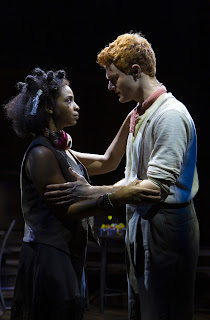Once upon a time I went to a show and it was called Hadestown. The music, lyrics, and book were by Anaïs Mitchell and it was developed with and directed by Rachel Chavkin. The music supervision and vocal arrangements were by Liam Robinson and the choreography was by David Neumann. It was about Orpheus (Nicholas Barasch) and Eurydice (Morgan Siobhan Green) who met at the railway to Hell. Hermes (Levi Kreis) encourages them to fall in love and narrates the story to the audience. Persephone (Kimberly Marable) has returned up above bringing spring with her and leaving Hades (Kevyn Morrow) behind, but as Orpheus and Eurydice fall more deeply in love, Persephone reluctantly prepares to return to the underworld. This show explores love, trust, and capitalism through heartfelt music, dynamic movement, and detailed character work.
I love how intimate this musical feels even though most of the theaters this production will be playing in seat hundreds of people. The cast creates this bond with the audience from the first moments and it is palpable throughout. At the beginning of the show, Hermes introduces us to all the characters we will see. Kreis made a point of making the audience feel like he was connecting with every single audience member through directing his lines not only to the people in the front row but also to the balcony. This gave off a very presentational energy but the actor's high intensity didn't make the message or storytelling feel any less genuine or personal. This is something I have rarely felt in a large-house show. Marable as Persephone also had a really great connection with the audience and the ensemble. As she was making the people at the railroad station fall in love with her, the audience was enamored too. Her energy was so welcoming and she took moments to glance at the audience and wordlessly joke with them about the events on stage.
I absolutely loved both the style and execution of the movement in this production. It was very fluid and felt like every movement led into the next. It had a lot of attack and seemed very passionate. There was a compelling contrast being the way the gods moved and the way that Hades's workers (Sydney Parra, Will Mann, Lindsey Hailes, Jamari Johnson Williams, and Chibueze Ihuoma) moved. Hades's workers were very uniform and regimented in their movement. And even when they were not moving together, it felt like they were staggering the same movements. This constant movement during most of the second act from the workers made for an intense and realized atmosphere, which kept the fact of their roles as human cogs in the capitalist machine present in the minds of the audience. On the other hand, the gods and the Fates (Belén Moyano, Bex Odorisio, and Shea Renne) had a jazz-based and exuberant movement. The gods are usually very poised and celebratory, however, as Persephone is having an internal battle about her relationship with her husband, Hades, she starts to convulse, using her movement to demonstrate the torment she is going through. This was not a side of Persephone we viewed when she was on the surface with humans; it is only apparent in the underworld. This was very effective and made her a more complex and lovable character.
I really connected to and was impressed by the metaphors present in this play, especially those referring to self doubt. The myth has always seemed to me about a lack of trust in one’s partner, but here it feels more about lack of faith in one’s self. Within this production the Chorus of Fates represent many internal debates that the humans go through. However, the one that ends up feeling the most crushing is how Orpheus slowly and brutally loses all the confidence Eurydice has built up in him across their tender and heart-wrenchingly beautiful relationship. Orpheus is then separated from the thing he loved most because of his own self doubt and fear of not being enough for Eurydice. This reflects one of Eurydice’s critical moments earlier in the play in the song “When the Chips are Down.” The fates circle and entrance Eurydice into selling her soul to Hades, both literally and figuratively. This song’s harmonies are so tight and mesmerizing that it begins to have this hypnotic effect on the listener as we start to question the very relationship between Eurydice and Orpheus that we have grown to support. It can be very difficult to have a characters function symbolically without seeming contrived, but the Fates do an excellent job of being complex and frightening while also adapting to the emotion or gut feeling they are portraying at the time.
People who would like this show are people who like hypnotizing Fates,large spaces with a lot of heart, and gods going hard on the dance floor. I am such a fan of the music in this show, and watching these amazingly talented actors bring that music and story to life is an absolutely transformative joy to watch.
Photos: T Charles Erickson













